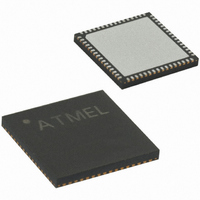ATMEGA128RFA1-ZU Atmel, ATMEGA128RFA1-ZU Datasheet - Page 148

ATMEGA128RFA1-ZU
Manufacturer Part Number
ATMEGA128RFA1-ZU
Description
IC AVR MCU 2.4GHZ XCEIVER 64QFN
Manufacturer
Atmel
Series
ATMEGAr
Datasheets
1.ATMEGA128-16AU.pdf
(385 pages)
2.ATAVR128RFA1-EK1.pdf
(13 pages)
3.ATAVR128RFA1-EK1.pdf
(555 pages)
4.ATMEGA128RFA1-ZU.pdf
(524 pages)
Specifications of ATMEGA128RFA1-ZU
Frequency
2.4GHz
Data Rate - Maximum
2Mbps
Modulation Or Protocol
802.15.4 Zigbee
Applications
General Purpose
Power - Output
3.5dBm
Sensitivity
-100dBm
Voltage - Supply
1.8 V ~ 3.6 V
Current - Receiving
12.5mA
Current - Transmitting
14.5mA
Data Interface
PCB, Surface Mount
Memory Size
128kB Flash, 4kB EEPROM, 16kB RAM
Antenna Connector
PCB, Surface Mount
Operating Temperature
-40°C ~ 85°C
Package / Case
64-VFQFN, Exposed Pad
Rf Ic Case Style
QFN
No. Of Pins
64
Supply Voltage Range
1.8V To 3.6V
Operating Temperature Range
-40°C To +85°C
Svhc
No SVHC (15-Dec-2010)
Rohs Compliant
Yes
Processor Series
ATMEGA128x
Core
AVR8
Data Bus Width
8 bit
Program Memory Type
Flash
Program Memory Size
128 KB
Data Ram Size
16 KB
Interface Type
JTAG
Maximum Clock Frequency
16 MHz
Number Of Programmable I/os
38
Number Of Timers
6
Operating Supply Voltage
1.8 V to 3.6 V
Maximum Operating Temperature
+ 85 C
Mounting Style
SMD/SMT
3rd Party Development Tools
EWAVR, EWAVR-BL
Development Tools By Supplier
ATAVR128RFA1-EK1
Lead Free Status / RoHS Status
Lead free / RoHS Compliant
Available stocks
Company
Part Number
Manufacturer
Quantity
Price
Part Number:
ATMEGA128RFA1-ZU
Manufacturer:
ATMEL/爱特梅尔
Quantity:
20 000
Company:
Part Number:
ATMEGA128RFA1-ZUR
Manufacturer:
ON
Quantity:
56 000
- ATMEGA128-16AU PDF datasheet
- ATAVR128RFA1-EK1 PDF datasheet #2
- ATAVR128RFA1-EK1 PDF datasheet #3
- ATMEGA128RFA1-ZU PDF datasheet #4
- Current page: 148 of 385
- Download datasheet (8Mb)
Force Output
Compare
Compare Match
Blocking by TCNT2
Write
Using the Output
Compare Unit
Compare Match
Output Unit
148
ATmega128
ering is disabled. The double buffering synchronizes the update of the OCR2 Compare Register
to either top or bottom of the counting sequence. The synchronization prevents the occurrence
of odd-length, non-symmetrical PWM pulses, thereby making the output glitch-free.
The OCR2 Register access may seem complex, but this is not case. When the double buffering
is enabled, the CPU has access to the OCR2 buffer Register, and if double buffering is disabled
the CPU will access the OCR2 directly.
In non-PWM Waveform Generation modes, the match output of the comparator can be forced by
writing a one to the force output compare (FOC2) bit. Forcing compare match will not set the
OCF2 flag or reload/clear the timer, but the OC2 pin will be updated as if a real compare match
had occurred (the COM21:0 bits settings define whether the OC2 pin is set, cleared or toggled).
All CPU write operations to the TCNT2 Register will block any compare match that occur in the
next timer clock cycle, even when the timer is stopped. This feature allows OCR2 to be initialized
to the same value as TCNT2 without triggering an interrupt when the Timer/Counter clock is
enabled.
Since writing TCNT2 in any mode of operation will block all compare matches for one timer clock
cycle, there are risks involved when changing TCNT2 when using the output compare channel,
independently of whether the Timer/Counter is running or not. If the value written to TCNT2
equals the OCR2 value, the compare match will be missed, resulting in incorrect waveform gen-
eration. Similarly, do not write the TCNT2 value equal to BOTTOM when the counter is
downcounting.
The setup of the OC2 should be performed before setting the Data Direction Register for the port
pin to output. The easiest way of setting the OC2 value is to use the Force Output Compare
(FOC2) strobe bits in normal mode. The OC2 Register keeps its value even when changing
between waveform generation modes.
Be aware that the COM21:0 bits are not double buffered together with the compare value.
Changing the COM21:0 bits will take effect immediately.
The Compare Output mode (COM21:0) bits have two functions. The waveform generator uses
the COM21:0 bits for defining the output compare (OC2) state at the next compare match. Also,
the COM21:0 bits control the OC2 pin output source.
the logic affected by the COM21:0 bit setting. The I/O registers, I/O bits, and I/O pins in the fig-
ure are shown in bold. Only the parts of the general I/O Port Control Registers (DDR and PORT)
that are affected by the COM21:0 bits are shown. When referring to the OC2 state, the reference
is for the internal OC2 Register, not the OC2 pin. If a System Reset occur, the OC2 Register is
reset to “0”.
Figure 64
shows a simplified schematic of
2467V–AVR–02/11
Related parts for ATMEGA128RFA1-ZU
Image
Part Number
Description
Manufacturer
Datasheet
Request
R

Part Number:
Description:
Manufacturer:
ATMEL Corporation
Datasheet:

Part Number:
Description:
Microcontroller with 128K bytes In-system programmable flash, 8 MHz, power supply =2.7 - 5.5V
Manufacturer:
ATMEL Corporation
Datasheet:

Part Number:
Description:
IC AVR MCU 128K 16MHZ 5V 64TQFP
Manufacturer:
Atmel
Datasheet:

Part Number:
Description:
IC AVR MCU 128K 16MHZ 5V 64-QFN
Manufacturer:
Atmel
Datasheet:

Part Number:
Description:
IC AVR MCU 128K 16MHZ COM 64-QFN
Manufacturer:
Atmel
Datasheet:

Part Number:
Description:
IC AVR MCU 128K 16MHZ 64-TQFP
Manufacturer:
Atmel
Datasheet:

Part Number:
Description:
IC AVR MCU 128K 16MHZ 64-TQFP
Manufacturer:
Atmel
Datasheet:

Part Number:
Description:
IC AVR MCU 128K 16MHZ IND 64-QFN
Manufacturer:
Atmel
Datasheet:

Part Number:
Description:
MCU AVR 128KB FLASH 16MHZ 64TQFP
Manufacturer:
Atmel
Datasheet:

Part Number:
Description:
MCU AVR 128KB FLASH 16MHZ 64QFN
Manufacturer:
Atmel
Datasheet:

Part Number:
Description:
MCU AVR 128KB FLASH 16MHZ 64TQFP
Manufacturer:
Atmel
Datasheet:











